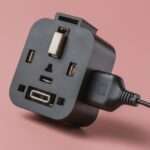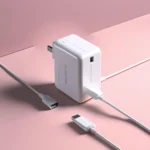Introduction
Ever noticed your charger getting unusually hot? It’s not just annoying; it can be downright dangerous. Let’s dive into the world of laptop charger overheating, explore why it happens, and learn how to prevent it.

Understanding the Issue of Laptop Charger Overheating
Laptop Charger overheating is a common problem faced by many laptop users. Whether you’re charging your smartphone, tablet, or laptop, the heat emitted from chargers can sometimes be alarmingly high. But why does this happen, and what can we do about it?
Why It’s Important to Address Charger Overheating
Ignoring an overheating charger can lead to serious consequences. Not only can it damage your device, but it can also pose a fire hazard. Addressing the issue early on ensures the safety of your devices and your home.
What Causes Charger Overheating?
Overloading the Charger
When you use a charger that’s not designed for your device, it can struggle to meet the power requirements, leading to overheating. Always ensure your charger matches your device’s specifications.

Poor Quality Chargers
Cheap, off-brand chargers might save you a few bucks, but they often lack the necessary safety features. Investing in a high-quality charger can prevent overheating issues.
Environmental Factors
Charging your device in a hot environment can exacerbate overheating. Always try to charge your devices in a cool, ventilated area.
Prolonged Usage
Continuous use of a charger without breaks can cause it to heat up. Giving your charger some downtime can help maintain its temperature.
Symptoms of a Overheating Charger
Unusual Heat Emission
If your charger is too hot to touch, that’s a clear sign of overheating. This is the most obvious symptom and should never be ignored.
Charger Stops Working Intermittently
An overheating charger might stop and start working sporadically. This inconsistency is a sign that something is wrong.
Visible Damage
Look out for burn marks, melting, or discoloration on your charger. These are all red flags indicating overheating.
Potential Risks of Using an Overheating Charger
Damage to Devices
An overheating charger can send too much heat to your device, potentially causing internal damage.
Fire Hazard
There’s a significant risk of fire if a charger overheats. This can not only destroy property but also pose serious health risks.
Reduced Charger Lifespan
Consistently overheating can wear out a charger prematurely, making it less effective over time.
How to Prevent Laptop Charger Overheating
Use Quality Chargers
Invest in chargers from reputable brands. They come with built-in safety features that prevent overheating.

Avoid Overloading
Match your charger to your device’s power needs. Avoid using chargers that are not designed for your specific device.
Charge in a Cool Environment
Keep your charging area cool and well-ventilated. Avoid placing chargers on soft surfaces like beds or couches, which can trap heat.
Unplug When Not in Use
When your device is fully charged, unplug the charger. This not only saves energy but also prevents overheating.
Troubleshooting Overheating Issues
Checking the Charger Compatibility
Ensure that your charger is compatible with your device. Mismatched chargers are a common cause of overheating.
Inspecting for Physical Damage
Regularly check your charger for any physical damage. Cracks, frays, or burn marks are all signs that it’s time for a new charger.
Monitoring Charger Performance
Keep an eye on how your charger performs. If it starts to overheat or work intermittently, it might be time for a replacement.
Choosing the Right Charger

Importance of Brand and Quality
Opt for well-known brands that have a reputation for quality. They are more likely to have undergone rigorous safety testing.
Features to Look For
Look for features like overheat protection, surge protection, and automatic shutoff. These can help prevent overheating.
Certification and Safety Standards
Ensure your charger meets safety standards and has the necessary certifications. This adds an extra layer of assurance against overheating.
Maintaining Your Charger
Regular Inspections
Make it a habit to inspect your charger regularly. Early detection of issues can prevent bigger problems.
Proper Storage
Store your charger in a cool, dry place. Avoid leaving it in hot areas like a car on a sunny day.
Cleanliness
Keep your charger clean and free of dust. Dust can accumulate and cause overheating.
What to Do If Your Charger Overheats
Immediate Steps to Take
If you notice your charger overheating, unplug it immediately. Let it cool down before using it again.
When to Replace Your Charger
If your charger continues to overheat despite troubleshooting, it’s time to get a new one. Don’t take any risks with a faulty charger.
Professional Help
If you’re unsure about your charger’s condition, seek professional help. An expert can provide a thorough inspection and advice.
Future Trends in Charger Technology
Advances in Charging Efficiency
Technological advancements are making chargers more efficient and less prone to overheating. Look out for new models that offer improved safety features.
Smart Chargers
Smart chargers that can adjust power output based on the device’s needs are becoming more popular. These can help prevent overheating.
Sustainable Charging Solutions
Eco-friendly chargers made from sustainable materials are on the rise. These not only help the environment but also often include advanced safety features.
Conclusion
Charger overheating is a serious issue that shouldn’t be ignored. By understanding the causes and symptoms, you can take steps to prevent it and ensure your devices and home remain safe. Always invest in quality chargers, use them properly, and stay informed about the latest in charger technology to keep overheating at bay.
FAQs
Why does my charger get hot?
Your charger might get hot due to overloading, poor quality, or environmental factors. Always ensure you’re using the right charger for your device and keep it in a cool, ventilated area.
Can a hot charger damage my phone?
Yes, a hot charger can potentially damage your phone by overheating its internal components. It’s crucial to address any overheating issues promptly.
How can I tell if my charger is overheating?
Signs of an overheating charger include excessive heat, intermittent performance, and visible damage like burn marks or melting.
Are there chargers that don’t overheat?
While no charger is completely immune to overheating, high-quality chargers with built-in safety features significantly reduce the risk.
What should I do if my charger catches fire?
If your charger catches fire, unplug it immediately if it’s safe to do so and use a fire extinguisher to put out the flames. Contact emergency services if the fire spreads.

